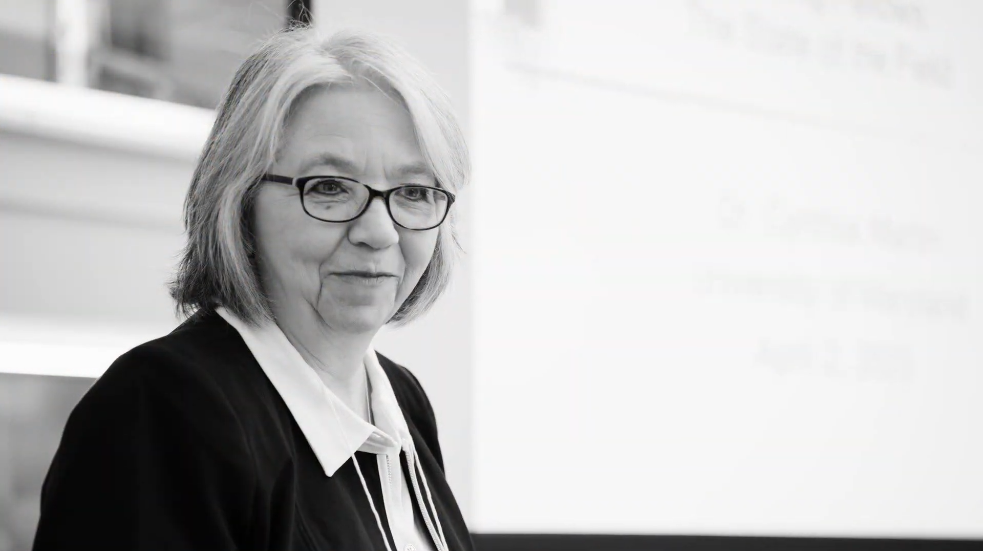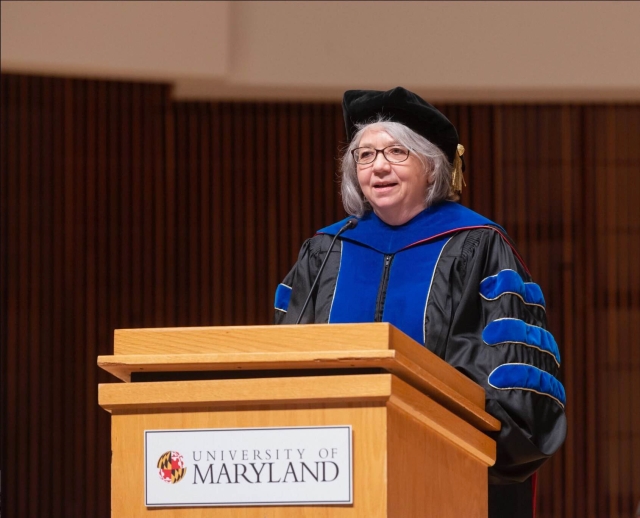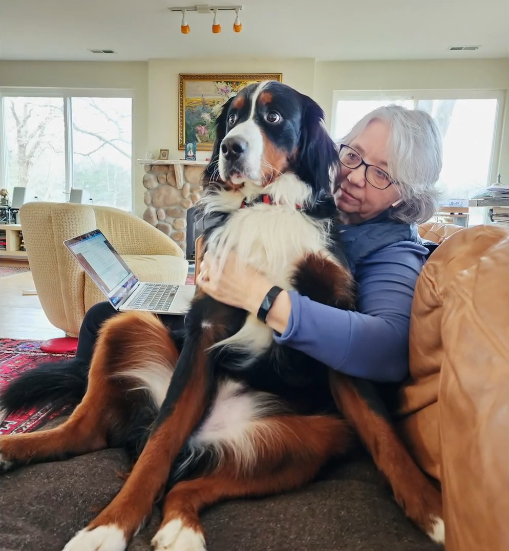Honoring a Life of Language, Learning and Kindness: Remembering Cynthia ‘Cindy’ Martin
February 05, 2025

The beloved Russian professor and mentor shaped generations of students and made indelible contributions to foreign language education.
By Jessica Weiss ’05
Russian professor Cynthia “Cindy” Martin’s infectious enthusiasm for learning and deep kindness shaped countless lives during her nearly 35 years at the University of Maryland. Her sudden passing on Dec. 3 has left a profound void across the university and the wider field of foreign language education.
Her colleagues remember her as a transformative educator and an inspiring presence. “She was just a force,” said Associate Professor and head of Russian Elizabeth Papazian, who counted Martin as a mentor; “of energy, of enthusiasm, of great love for students and for colleagues.”
Mary Ellen Scullen, the director of the School of Languages, Literatures, and Cultures (SLLC), called Martin a “beloved teacher, an inspiring mentor, a generous colleague, and a dear friend to many.”
“She leaves behind an enormous legacy and a huge void,” Scullen said.
Martin was born in 1958 in New York. She first discovered her love for Russian history as an undergraduate at the University of New Hampshire. While studying abroad in St. Petersburg—then called Leningrad—in 1979, Martin met Alexander Bobilev in the lobby of the Hotel Europe when he asked for a match to light his cigarette. Bobilev, an English-speaking interpreter, struck up a conversation that marked the beginning of their relationship.
After earning her B.A. in Russian studies and political science from the University of New Hampshire, Martin returned to Russia to deepen her studies at the Pushkin Institute of Russian Language and Literature. She then secured a position as a translator and editor at a publishing house in Moscow. She and Bobilev married in 1986.
As she pursued an M.A. and later a Ph.D. in Russian language at the University of Pennsylvania, Martin’s exceptional proficiency in Russian opened numerous career opportunities. She worked as a translator and interpreter for government agencies and the military and took on projects for NASA, where she collaborated with international astronauts preparing for missions to the International Space Station.
And she became the primary translator for renowned artist Ilya Kabakov, a role she fulfilled until his passing in 2023. Over decades, she translated some 25 of Kabakov’s books, as well as hundreds of catalogues, articles and proposals for his major installations and exhibits.
Zhanna R. Gerus-Vernola, Maya Brin Distinguished Lecturer of Russian, who studied and worked with Martin for many years, said she was shocked upon learning Martin was American. “Her Russian was flawless,” she said. “I couldn’t detect any mistakes or accent.”
Martin arrived at the University of Maryland in 1990 as an assistant professor of Russian and quickly became known for her infectious enthusiasm for Russian language and culture. Over more than three decades at UMD, she served as a research advisor to dozens of undergraduate, masters and doctoral students and served tirelessly on a variety of committees. Most recently, she was the head of the Russian department.
Meanwhile, her deep interest in second language acquisition and assessment, methodology and pedagogy, theory and practice, materials and curriculum development led her to author or co-author textbooks and curricular materials used across the U.S. She spearheaded national initiatives to establish assessments for evaluating Russian proficiency and was an active tester and trainer with the American Council on the Teaching of Foreign Languages.
“She was a true expert,” said Assistant Professor of Russian Michael Lavery. “Virtually every modern instructor of Russian uses the framework that Cindy helped introduce to the field.”
Her teaching philosophy, rooted in compassion and empathy, centered on “helping students navigate the often humbling journey of learning Russian," Lavery said. “She would often lament that students and instructors alike call the less commonly taught languages ‘difficult’—’difficult for whom?’ It all depends on where you come from, linguistically, and where you are trying to go. For the native English speaker, a language like Russian is not ‘hard’; it just takes a long time for your brain to adapt to the new patterns. You have to learn to tolerate discomfort, run towards it—it’s not only unavoidable, but it’s a sign of growth.”
Elizabeth Morgan ’12 said Martin helped her identify as a Russian scholar when she felt directionless as a student. “She suggested I apply for the Benjamin A. Gilman scholarship to study in Russia, so I did and when I told her I got the award, she said, ‘Of course you did!’,” Morgan recalled. “She was one of the people I'd reach out to or think about whenever I was abroad feeling homesick.”
Martin is remembered widely for making the Russian program feel like a tight-knit family.
Anastasia Selemeneva, who taught Slavic languages in SLLC from 2016-21, remembered how Martin welcomed her upon her arrival to the university: “Quite literally, with open arms. She gave me a big hug, and I immediately felt at home.” Selemeneva also recalled how Martin brought a collection of children’s books in Russian for her young daughter.
“With Cindy, you always felt you were being wisely advised, protected and supported,” said Gerus-Vernola, who first began working with Martin in 1999 as a newly admitted graduate student in the Russian department. “She had a way of gently pushing you forward, while ensuring your back was always covered. She radiated positivity and cheerfulness, creating an uplifting energy around her.”
Outside the classroom, Martin was a devoted mother to her two children, Anastasia and Max, and an avid traveler who visited over 30 countries. She loved taking walks with her dog Ovi, named after the famous Russian hockey player Alexander Ovechkin, and watching hockey with her family.
“And she was hilarious,” said Margaret “Peggy” Mills, Professor Emerita of Russian at the University of Iowa. She remembered one winter in the mid-1990s when she and Martin ended up on the same flight from D.C. to Moscow: “Cindy turned out to be a one-woman stand-up brilliant interlocutor—the entire 8-plus hours. No one told a funnier story better than Cindy, even if she bore the brunt of the joke.”
Her adventurous spirit reflected her curiosity about people and cultures, traits she passed on to her family.
Anastasia, a neuroscientist who is currently completing an M.B.A. at UCLA, said her mom was endlessly supportive, always encouraging her and her brother to follow their passions and ideas—and finding ways to help along the way.
“She was so curious,” she said. “She just wanted to see the whole world and get to know everybody.”
Members of the campus community gathered December 12 to honor Martin. Colleagues and students contributed memories of her, available to read here.



